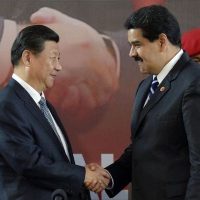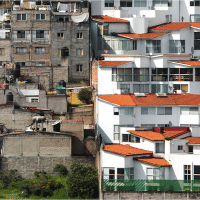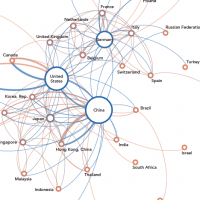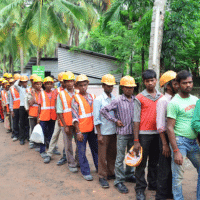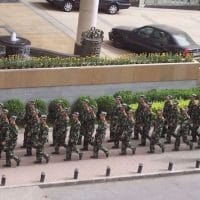-
As the far-right wins Indian elections, progressive forces vow to resist
The modern global economy, essentially guarantees the continued expatriation of profits and natural assets from resource-rich but capital-poor countries, facilitating the enrichment of the global economic elite and Multinational Corporations (MNC), at the expense of developing countries. To elaborate on the themes of corporate plunder, resource nationalism and people-centered forms of resource management, Tricontinental: Institute for Social Research spoke with Gyekye Tanoh, head of the Political Economy Unit at the Third World Network-Africa based in Accra (Ghana).
-
PepsiCo and Monsanto’s bogus court cases are war on Indian farmers
At the heart of the struggle is capital’s need–Monsanto and Pepsico’s–to continuously enclose spheres and generate surpluses from creating a monopoly over something that it does not actually own.
-
‘Unions must provide political education or labor will find itself more powerless than ever before’—Timir Basu on labor in India
The phenomenal growth of the services sector has created a new generation of employees. For these workers, May Day has very little meaning—what they fail to grasp is that they cannot protect their future without knowing their past.
-
U.S. imperialist domination in Latin America and Europe
The history of empires amply demonstrates that in their phase of decline they become more violent and bloodthirsty, and that their leaders tend to be coarser and more brutal. Not only their leaders, as Donald Trump clearly demonstrates. Also its environment of advisors reflects similar devolution, becoming something similar to what Harold Laski, referring to the leaders of European fascism, called “outlaw elites”.
-
Eight Years After: No End in Sight for Clearing the Fukushima Nuclear Disaster
The most critical problem is that three reactors in the Fukushima Daiichi nuclear power plant had been damaged and the 250 tons of more than 1600 spent fuel rods were “reckoned” to have fallen to the bottom of the reactor vessel after having melted at high temperatures. The radiation level there was too high for humans to possibly come close, let alone remove the molten nuclear residue.
-
China in Latin America: the U.S. loses its “backyard”
China formally invited Latin America to participate in the Belt and Road Initiative in January 2018, during its meeting with the Community of Latin American and Caribbean States (CELAC) in Santiago, Chile, where the Chinese and Venezuelan chancellors shook hands. Since then, 16 countries in the region have expressed their intention to be part of this trade connection project and have signed agreements to do so.
-
Unequal scenes
Inequalities in our social fabric are oftentimes hidden, and hard to see from ground level. Visual barriers, including the structures themselves, prevent us from seeing the incredible contrasts that exist side by side in our cities.
-
The uneasy U.S.-China relationship: what lies ahead?
The U.S. and China are the two dominant poles in the global economy, as illustrated in the figure below which traces the global trade in parts and components.
-
Shadow of fascism
In its attack on civil liberties, its restructuring of the State to effect an acute centralization of power, and its pervasive purveyance of fear, the Modi years resemble Indira Gandhi’s Emergency. But the resemblance stops there. In fact the two differ fundamentally in several ways.
-
The sunrise will be the same for those who wake and those who never will
Disregard by the dominant powers of human lives in places such as Iraq has a long history. It goes back a hundred years.
-
Killing the most beautiful things we own
The fight over the Amazon is not new, but the scale of its potential destruction has considerably increased. The protagonists of the murder of the Amazon are clear: capitalist firms of different scales and the political class that enables them.
-
Lawyer brings pieces of history back to Vietnam
American lawyer Nancy Hollander recently handed 450 documents, photographs and other memorabilia concerning the first meeting between the Vietnamese Women’s Union and the U.S. Women Strike for Peace Organisation in Jakarta in 1965, to the Vietnamese Women’s Museum.
-
How economics is serving to camouflage imperialism
The intellectual hegemony of mainstream bourgeois economics, by invariably seeing capitalism as a self-contained closed system, serves to obscure the phenomenon of imperialism.
-
Utsa Patnaik on agrarian history and imperialism
Humanity does not end where Europe ends, or America ends. Lenin’s contribution as well as Rosa Luxembourg’s work are both of inestimable value because they applied the Marxist method to areas that Marx himself had not touched.
-
China has an unemployment problem
Strikingly few discussions of China’s declining growth trajectory include mention of the country’s unemployment rate. Unfortunately, this official rate is worthless as an indicator of the China’s labor market conditions. In reality, China likely has a serious and growing unemployment problem.
-
Constitution is supreme and above all the customs and beliefs: Kerala CM Pinarayi Vijayan
In conversation with the Chief Minister who just completed 1,000 days in office
-
War with China?
Perhaps the greatest victim of this ongoing conflict will be planet Earth itself and all the creatures, humans included, who inhabit it. As the world’s top two emitters of climate-altering greenhouse gases, the U.S. and China must work together to halt global warming or all of us are doomed to a hellish future.
-
AGO proposes nationwide raids on books containing ’banned ideas’
Attorney General Muhammad Prasetyo is proposing that massive raids be carried out to hunt down books which contain communist teachings and banned ideologies. The proposal was made after the seizure of hundreds of books around the country allegedly containing “banned ideas”. — Taufiq Siddiq, Jakarta “I’m proposing that if possible, yes massive raids be carried […]
-
Britain robbed India of $45 trillion & Thence 1.8 billion Indians died from deprivation
Eminent Indian economist Professor Utsa Patnaik (Jawaharlal Nehru University) has estimated that Britain robbed India of $45 trillion between 1765 and 1938, however it is estimated that if India had remained free with 24% of world GDP as in 1700 then its cumulative GDP would have been $232 trillion greater (1700-2003) and $44 trillion greater (1700-1950).
-
Struggles that make the land proud
On 8 and 9 January, over 160 million workers went on strike in India from a broad range of sectors, from industrial workers to health care workers. This has been one of the largest general strikes in the world.






